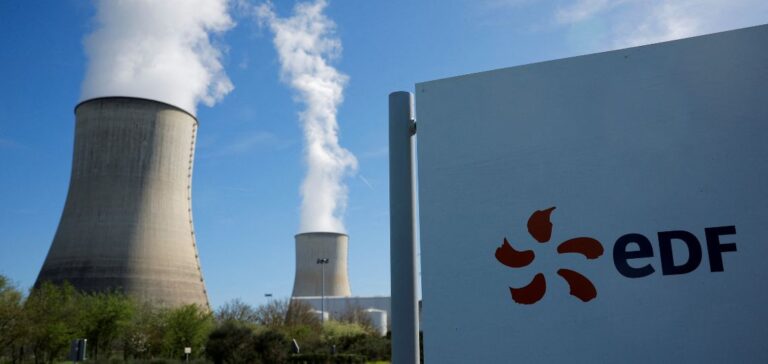EDF, France’s leading electricity producer and supplier, posted a net profit of 7 billion euros in the first half of 2024, an increase of 21% on the previous year.
This performance is attributed to a marked improvement in nuclear and hydroelectric production.
However, the Group anticipates a sustained fall in electricity prices on the markets, likely to weigh on its future financial results.
In France, nuclear generation rose by 19.4 terawatt-hours (TWh), reaching a total of 177.4 TWh for the first half of the year.
This turnaround is the result of concerted efforts to restore high production levels, as EDF CEO Luc Rémont points out.
The company expects nuclear output for 2024 to be at the high end of forecasts, between 315 and 345 TWh, with similar estimates for 2025 and 2026.
Financial and historical background
By 2023, EDF had posted a net profit of 10 billion euros, a significant turnaround after a loss of 17.9 billion euros in 2022.
This loss was mainly due to corrosion problems in several nuclear reactors and maintenance delays linked to the Covid-19 pandemic.
In 2022, EDF was unable to take full advantage of rising electricity prices, being forced by the French government to sell part of its production at reduced rates.
Last year, without the state restrictions, EDF was able to sell more electricity at higher prices, which largely contributed to its improved financial results.
However, in 2024, market electricity prices fell sharply, and this trend is set to continue, affecting the Group’s profitability.
Adaptation strategies and future prospects
Luc Rémont points out that the fall in electricity prices should stabilize at a lower level than in the previous year.
In response to this situation, EDF is planning measures to transform and improve economic performance, in order to maintain sufficient financing capacity for its future investments, which are necessary for the energy transition.
Despite its substantial debt of 54.2 billion euros, EDF continues to face major industrial and financial challenges, with annual investment requirements of around 25 billion euros.
The Group has to manage an ageing fleet of reactors while building new reactors, both in France and abroad, and increasing its wind and solar power production.
Projects and Investments
EDF’s “Ambitions 2035” plan aims to support its customers in reducing their carbon footprint, produce more decarbonized electricity, develop electricity networks and accelerate flexibility solutions to meet the needs of the power system.
This ambitious plan aims to transform the energy landscape in France and strengthen EDF’s position as a leader in the sector.
EDF recently announced a pre-tax provision of 3.3 billion euros to cover the increased costs of spent fuel storage at Orano’s La Hague site.
The Group is also preparing to commission its new-generation EPR nuclear reactor in Flamanville, whose startup is imminent after a 12-year delay.
These initiatives show that EDF is determined to play a central role in the energy transition, despite the challenges posed by volatile electricity prices and the financing requirements of its long-term projects.
The success of these projects will be crucial in ensuring EDF’s financial stability and competitiveness in the years ahead.






















